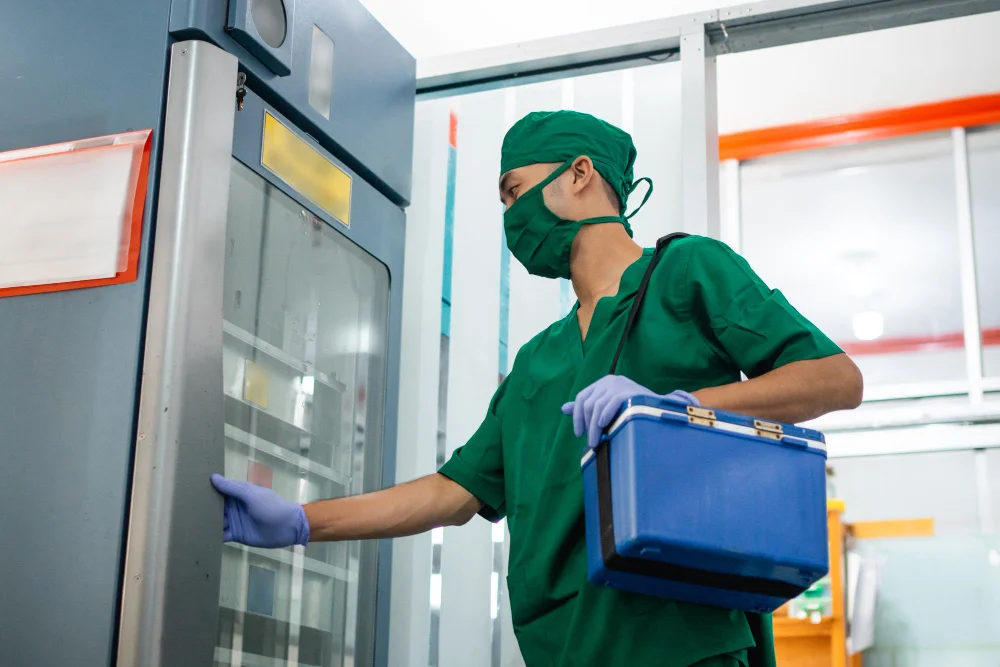In the realm of medical logistics, ensuring the safe and efficient transportation of temperature-sensitive items such as medications, specimens, and vaccines is of paramount importance. The advent of temperature-sensitive medical transport boxes has revolutionized the way these critical materials are handled, preserving their integrity and potency throughout their journey. This article provides an in-depth examination of the technology behind temperature-sensitive medical transport boxes and highlights their significance in safeguarding medications, specimens, and vaccines, with a focus on the role of 20°C ultra-low lab freezers.
Understanding Temperature-Sensitive Medical Transport Boxes
Temperature-sensitive medical transport boxes are purpose-built containers designed to maintain specific temperature ranges, ensuring that sensitive medical contents remain within their required conditions during transit. These boxes are equipped with advanced thermal insulation and temperature control mechanisms to combat external temperature fluctuations that could compromise the efficacy and safety of the enclosed materials.
Technology Behind Temperature Control
- Insulation: The foundation of temperature control lies in the insulation of these transport boxes. High-quality insulating materials create a barrier that minimizes heat transfer, effectively creating a microclimate within the box.
- Thermal Regulation Systems: Medical transport boxes employ various thermal regulation systems, including advanced refrigeration or heating elements, Peltier devices, or phase change materials. These systems adjust the internal temperature to match the desired range.
- Temperature Monitoring: Many modern medical transport boxes incorporate sophisticated temperature monitoring systems. Sensors placed within the box constantly measure the internal temperature, transmitting real-time data to external monitoring devices or central systems.
- Power Sources: To ensure uninterrupted temperature control during transportation, medical transport boxes may utilize a range of power sources, including mains power, batteries, or even solar panels, depending on the specific use case.
Importance in Safeguarding Medications, Specimens, and Vaccines
- Preserving Medication Efficacy: Medications, especially those with sensitive compounds, enzymes, or biological components, require precise temperature control to maintain their chemical composition and effectiveness. Temperature-sensitive medical transport boxes ensure that medications retain their potency, thereby safeguarding patient health.
- Vital for Specimen Integrity: Medical specimens, including biological samples such as blood, tissues, and DNA, are invaluable for diagnostics and research. Transporting specimens within the correct temperature range ensures their molecular structure remains intact, ensuring accurate analysis.
- Critical Role in Vaccine Distribution: The efficacy of vaccines hinges on their preservation within a specific temperature range. Medical transport boxes play a pivotal role in ensuring vaccines remain effective from the manufacturer to the end user. In this context, 20°C ultra-low lab freezers emerge as vital tools for storing vaccines before they are loaded into the transport boxes, maintaining their stability.
- Minimizing Wastage: Temperature-sensitive medical transport boxes reduce the risk of material wastage due to compromised efficacy. This is particularly relevant in scenarios where medications, specimens, or vaccines are expensive or scarce.
The Role of 20°C Ultra-Low Lab Freezers
Ultra-low lab freezers operating at temperatures around -20°C are instrumental in the process of preparing medications, specimens, and vaccines for transport in temperature-sensitive medical transport boxes. These freezers offer several advantages:
- Preservation of Samples: Ultra-low lab freezers ensure that medical specimens are stored at stable temperatures, preventing degradation and ensuring their integrity for accurate analysis.
- Optimal Vaccine Storage: Vaccines, especially those requiring storage at warmer temperatures, can be stored in 20°C ultra-low lab freezers before being loaded into transport boxes. This maintains their potency and prevents temperature shocks during the transportation process.
- Flexible Storage Solutions: Ultra-low lab freezers provide versatile storage for various medical materials, allowing healthcare professionals to efficiently prepare items for transportation.
Limitations of 20°C Ultra-Low Lab Freezers
- Limited Temperature Range: While 20°C ultra-low lab freezers offer suitable storage conditions for many medical materials, they may not be ideal for items requiring more extreme temperature ranges, such as extremely heat-sensitive medications or ultra-cold specimens.
- Energy Consumption: Maintaining a temperature of -20°C requires continuous energy input, contributing to energy consumption. As energy efficiency becomes a more significant concern, finding a balance between optimal storage conditions and energy usage is crucial.
Conclusion
Temperature-sensitive medical transport boxes are technological marvels that have redefined the way medications, specimens, and vaccines are transported. By harnessing advanced insulation, thermal regulation systems, and temperature monitoring, these boxes ensure that critical medical contents maintain their efficacy, integrity, and safety during transit. The role of 20C ultra-low lab freezers cannot be understated, as they lay the foundation for successful transportation by preserving materials at optimal temperatures before they are loaded into the transport boxes. Together, these innovations form a symbiotic relationship that strengthens the cold chain, ultimately enhancing patient care, medical research, and global health initiatives.


















